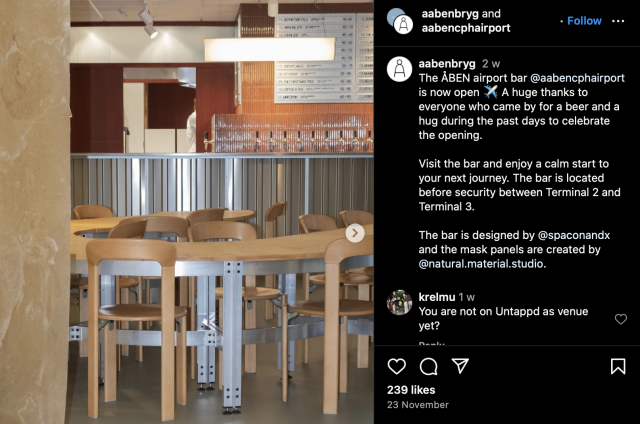This website uses cookies so that we can provide you with the best user experience possible. Cookie information is stored in your browser and performs functions such as recognising you when you return to our website and helping our team to understand which sections of the website you find most interesting and useful.
Restaurant panels made using leftover beer
A Copenhagen studio has made panels from spent grain used in beer production for a restaurant.

Natural Material Studio created ‘swirly’ panels which were created out of spent grain sourced from the Aben brewery in Copenhagen.
The particles were extracted as a wet pulp and then ground up into various sizes and then turned into panels using a plastic and chalk product created by the studio.
Once the panels were made, they were installed as wall dividers at the brewery’s airport Aben restaurant and bar.
Speaking to Dezeen, the designer of the panels at the studio, Bonnie Hvillum, said that the “mask” containing the spent grain was “almost like paint”.
She told the website that the team at the studio had to make sure that it did not ferment during the drying process.
She said: “We were dealing with something that had already been processed once in the beer production. We needed to be very careful around the reheating of the mask grains.
“If the mask fermented again, the panels would have never dried out.”
As a result, and also to make sure that excess water could escape during the cast process, she said it was a “game” of getting the panels to set without the mask starting to ferment.
Hvillum also said that they believed the panels worked well in the space, as they “really materialise the brewery’s beers”.
Aben also operates a taproom and bottle shop in Aarhus as well as another site which includes a restaurant and taproom which is situated in the heart of Copenhagen’s Meatpacking District.
Its beer range includes its signature beer, Bryg 61 (Brew 61), which is “named after the number of attempts it took before getting the recipe exactly right”.
In addition, it produces two to three new beers every month, which it says has created a “beer archive” of more than 100 brews, including IPAs, imperial stouts and a number of sours. Its brewery in Kolding has a restricted capacity, so most beers are seasonal, it said, and sold in limited numbers with a short time frame.

